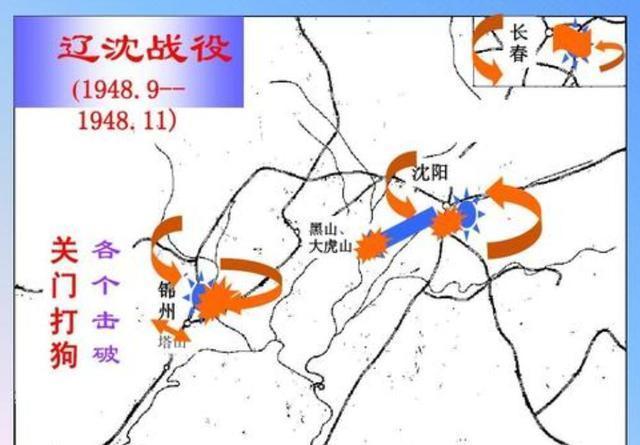What is history: it is the echo of the past to the future, the reflection of the future on the past. - Hugo
As we all know, the key battle of the Liaoshen Campaign was the Battle of Jinzhou. Interestingly, Chiang Kai-shek made a rare correction before the Liaoshen Campaign (although the reaction was still slower) and ordered Wei Lihuang, commander of the Kuomintang Northeast "Suppression Command", to send troops to open the Jinzhou communication line and prepare for retreat.

However, Chiang Kai-shek's order to open the Jinzhou communication line was met with collective resistance from the senior generals of the Northeast Nationalist Army represented by Wei Lihuang, resulting in the Delay in Opening the Jinzhou Communication Line. What is even more strange is that Chiang Kai-shek has never dared to explain to Wei Lihuang the importance of opening up the Jinzhou transportation line.
From August 1947 to October 1948, Chen Cheng, then commander of the Kuomintang's northeast "suppression" commandery, was beaten by the People's Liberation Army to "kill Chen Cheng to thank the world." Chiang Kai-shek had to find another general to replace Chen Cheng, and Chen Cheng also urgently needed to get out of the northeast, and the only general who could replace Chen Cheng at that time was Wei Lihuang.
However, Wei Lihuang knew very well that going to the northeast at this time was to carry the black cauldron for Chen Cheng, and resolutely did not agree to go to the northeast. Under the soft and hard bubbles and repeated persuasion of Chiang Kai-shek and Chen Cheng, Wei Lihuang agreed to replace Chen Cheng, but demanded that Chiang Kai-shek must agree to his four conditions before he could take office.
Wei Lihuang's four conditions were: First, if the northeast was lost, Wei Lihuang would not be liable; second, Chiang Kai-shek could not abandon the northeast; third, he would mobilize three or four armies to strengthen Jinzhou within three to four months; and fourth, he would use the air force to deliver supplies to Changchun, Shenyang, and Jinzhou.
In order to let Wei Lihuang hurry to the northeast to carry the pot, Chiang Kai-shek verbally agreed to all the conditions proposed by Wei Lihuang, and Wei Lihuang became the commander of the Kuomintang's northeast "suppression" commander- However, as soon as Wei Lihuang took office, Chiang Kai-shek reneged on his promise to strengthen Jinzhou and air supply, and did nothing.
It can be seen from this that Wei Lihuang was the first senior Kuomintang general to clearly understand the importance of the Jinzhou communication line, and he asked Chiang Kai-shek's attention before taking office. However, Chiang Kai-shek betrayed Wei Lihuang and did not strengthen Jinzhou according to the agreement, resulting in the Jinzhou communication line not being opened.
On the eve of the Liaoshen Campaign, Chiang Kai-shek naturally did not dare to explain to Wei Lihuang the importance of opening up the Jinzhou communication line, because Wei Lihuang knew it earlier than Chiang Kai-shek. The failure of the Jinzhou communication line to be opened was mainly the responsibility of Chiang Kai-shek, who naturally lacked confidence when he ordered Wei Lihuang.